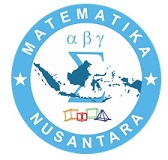PENGARUH PEMBELAJARAN RIGOROUS MATHEMATICAL THINKING (RMT) TERHADAP BEBAN KOGNITIF KONSTRUKTIF DAN KOMPETENSI STRATEGIS MATEMATIS SISWA DI PONDOK PESANTREN
Abstract
Mathematical Strategic Competence (MSC) is one of the components of Mathematics Proficiency needed in learning mathematics. After learning of mathematics sometimes students haven't been able to have MSC. So it takes an intruction to learning strategic competence of mathematical students. One of the intructions that can be used, namely the Rigorous Mathematical Thinking (RMT) intruction. RMT can also mediate the intruction makes it easy to process the received knowledge with the cognitive burden of providing the opportunity for constructive happens automatically to students. This study aims to know the effect RMT to MSC and Mathematical Germane Cognitive Load. This study is the research of design experimental with Treatment by Level 2x3 model Group Within Treatment (GWT). The subject is the class XI boarding schools Daar el-Qolam 1 (DQ1), DQ2 and DQ3 DQ4, who were randomized into 8 groups, namely: each one experimental class DQ1, DQ2, DQ3, DQ4 and control class one DQ1, DQ2, DQ3 and DQ4. The analysis of the data using analysis of variance (Anova) two way model GWT. The study results obtained (1) the Learning intruction alone does not effect the MCS of students, (2) Early Mathematics Ability (EMA) alone does not effect the MCS students, (3) there is the influence of the interactions between the learning intruction and EMA effect the MCS students. It appears also that the Group has no effect the MCS students, (4) students who were given RMT intruction is lower than direct intruction to students with high EMA, (5) students who were given RMT intruction is higher than direct intruction to students with medium EMA, (6) students who were given RMT intruction is lower than direct intruction to students with low EMA, (7) Germane Cognitive Load does effect students RMT intruction.
Keywords: Rigorous Mathematical Thinking, Mathematical Competence Strategic, Mathematical Germane Cognitive Load and Boarding Schools
Full Text:
PDFReferences
Fardillah, F. (2016). Kemampuan literasi dan disposisi statistis mahasiswa melalui pendekatan rigorous mathematical thinking (RMT) (studi pada mahasiswa di salah satu universitas di kota Tangerang). (Tesis). Sekolah Pascasarjana, Universitas Pendidikan Indonesia.
Hendrayana, A. (2013). Memahamkan Karekteristik dan Tujuan Matematika di Sekolah untuk Mengatasi Anak Yang Kesulitan Belajar dalam Matematika melalui RMT (Rigorious Mathematical Thinking). Journal Penelitian dan Pembelajaran Matematika, 5(1), hlm. 56-61.
Hendrayana, A. (2015). Pengaruh pembelajaran pendekatan rigorous mathematical thinking (RMT) terhadap pemahaman konseptual, kompetensi strategis, dan beban kognitif matematis siswa smp boarding school (sekolah berasrama). (Disertasi). Sekolah Pascasarjana, Universitas Pendidikan Indonesia.
Hendrayana, A. (2017). Pengaruh pembelajaran pendekatan rigorous mathematical thinking (RMT) terhadap pemahaman konseptual matematis siswa SMP. Jurnal Riset Pendidikan Matematika 4 (2), 2017, 186-199.
National Research Council [NRC]. (2002) Helping Children Learn Mathematics. Washington, DC: National Academy Press.
Kilpatrick, J., Swafford, J., & Findell, B. (2001). Adding+ It Up. Washington: National Academy Press.
Kinard, J.T. & Kozulin, A. (2008). Rigorous Mathematical Thinking. Cambridge: Cambridge University Press.
Kinard, J.T. & Kozulin, A. (2005). Rigorous Mathematical Thinking: Mediated Learning and Psychological Tools. Focus on Learning Problem in Mathematics, 27(3), hlm.123-134.
Kinard, J.T. (2006). Creating Rigorous Mathematical Thinking: A Dynamic that Drives Mathematics and Science Conceptual Development. Transylvanian Journal of Psychology. Special Issue No. 2, Supplement No. 2.
Kinard, J.T. & Falik, L. (2010). The fourth r: creating rigorous thinking through mediated learning experience and feuerstein’s instrumental enrichment program. Life Span and Disability - An Interdisciplinary Journal, 2(2), hlm.75–86.
Munirah, S (2014). Pendekatan rigorous mathematical thinking (RMT) untuk meningkatkan kemampuan pemecahan masalah matematis dan motivasi belajar siswa SMA (Penelitian kuasi eksperimen di kelas XI pada salah satu SMA di kota Bandung). (Skripsi). Universitas Pendidikan Indonesia.
National Research Council [NRC]. (2002) Helping Children Learn Mathematics. Washington, DC: National Academy Press.
Octyvera, R.M., Siswati, dan Sawitri, D.R. (2010). Hubungan Kualitas Kehidupan Sekolah dengan Penyesuaian Sosial pada Siswa SMA International Islamic Boarding School Republic of Indonesia. Psycho idea: jurnal ilmiah psikologi. 7(1), hlm. 53-64.
Skemp. R. (1976). Relational and instrumental understanding. Mathematics Teaching Journal. 77, hlm.20-26.
Vygotsky, L. (1978). Mind in Society. Cambridge, MA: Harvard University Press.
Piaget, J. (1952). The origins of intelligence in children (M. Cook, Trans.). New York: International Universities Press.
Polya, G. (1973). How to Solve It – a New Aspect of Mathematical Method. New Jersey: Princeton University Press.
Kozulin, A. (2003). Psychological Tools and Mediated Learning. Dalam Kozulin, A. dkk (Penyunting), Vygotsky’s Educational Theory in Cultural Context. New York: Cambridge University Press.
DOI: http://dx.doi.org/10.30870/jppm.v12i1.4853
Refbacks
- There are currently no refbacks.
Copyright (c) 2019 Jurnal Penelitian dan Pembelajaran Matematika
Ciptaan disebarluaskan di bawah Lisensi Creative Commons Atribusi 4.0 Internasional .
JPPM (Jurnal Penelitian dan Pembelajaran Matematika). Jurnal ini diterbitkan oleh Jurusan Pendidikan Matematika FKIP Universitas Sultan Ageng Tirtayasa (cetak) dan Jurnal Untirta (eprint).
Alamat Penerbit: Jl. Raya Ciwaru No 25 Kota Serang Banten, Jurusan Pendidikan Matematika, Fakultas Keguruan dan Ilmu Pendidikan, Universitas Sultan Ageng Tirtayasa, Kampus Ciwaru, Serang, Banten, Indonesia. Telepon / Faks: (0254) 280330 Ext 111, Email: [email protected] |Klik untuk mengakses: Jurnal Penelitian dan Pembelajaran Matematika


